In today’s digital world, businesses need to go online to succeed and reach their customers. Digital Marketing is a powerful tool that uses the internet to help businesses grow.
Table of Contents
Whether you’re starting a business, working in marketing, or just curious about digital marketing, this article will show you how to learn and master the important skills needed in today’s competitive online world.
Digital Marketing is really important for any businesses to do well, and this guide will give you the knowledge and strategies to thrive online, whether you’re just starting out or want to improve your skill.
Exploring the Journey of Digital Marketing
To understand digital marketing better, let’s explore how and when the concept of digital marketing emerged.
Digital marketing began when the internet became popular in the 1990s. Businesses saw the opportunity to promote their products and services online. They started by creating websites and sending emails to reach customers.
During the 2000s, search engines such as Google gained popularity. As a result, businesses started making efforts to improve their website’s visibility in search results by optimizing them. They also began utilizing paid advertisements on search engines to further promote their products or services.
Also, during the 2000s social media platform like Facebook and twitter emerged as marketing platform. Businesses realized they could directly interact with customers and share their messages.
With the rise of smartphones, mobile marketing became crucial. Businesses started creating mobile-friendly websites and advertising on mobile devices.
Content marketing also became popular. Businesses started creating valuable content to attract customers and using email marketing to send personalized messages.
Todays, digital marketing started with the internet and has evolved with new technologies. It is now a vital part of marketing for businesses to reach customers and grow online.
What is Digital Marketing?

Let us know what we mean exactly when we say “digital marketing”.
Digital marketing means that to promote products, makers or promoters use digital technologies instead of traditional marketing methods, such as advertising products on social media platforms, using mobile devices, or the internet. You must have seen different advertisements while browsing social media, websites or blog.
This includes different strategies, tactics, and tools that businesses use to connect with their target audience, build brand awareness, drive website traffic, and generate leads to achieve marketing objectives.
Importance of Digital Marketing
Digital marketing is very important in today’s businesses because digital marketing offers businesses a wide range of opportunities to reach and engage with their target audience.
Its expanded reach, cost-effectiveness, targeted marketing capabilities, measurable results, customer engagement, flexibility, brand development, and integration potential make it a vital tool for businesses in the digital age.
By leveraging digital marketing effectively, businesses can drive growth, increase brand awareness, and stay competitive in today’s dynamic business landscape.
Digital Marketing Advantages over Traditional Methods
Compared to traditional marketing strategies, digital marketing has several benefits. It is a vital tool for today’s highly competitive day because to its global reach, cost – effectiveness, targeted marketing capabilities, measurable outcomes, interaction, flexibility, increased brand recognition, and integration possibilities.
Using digital marketing tactics enables companies to successfully connect with their audience, promote engagement and conversions, make the most of their resources, and maintain their competitiveness in a world driven by digital technology.
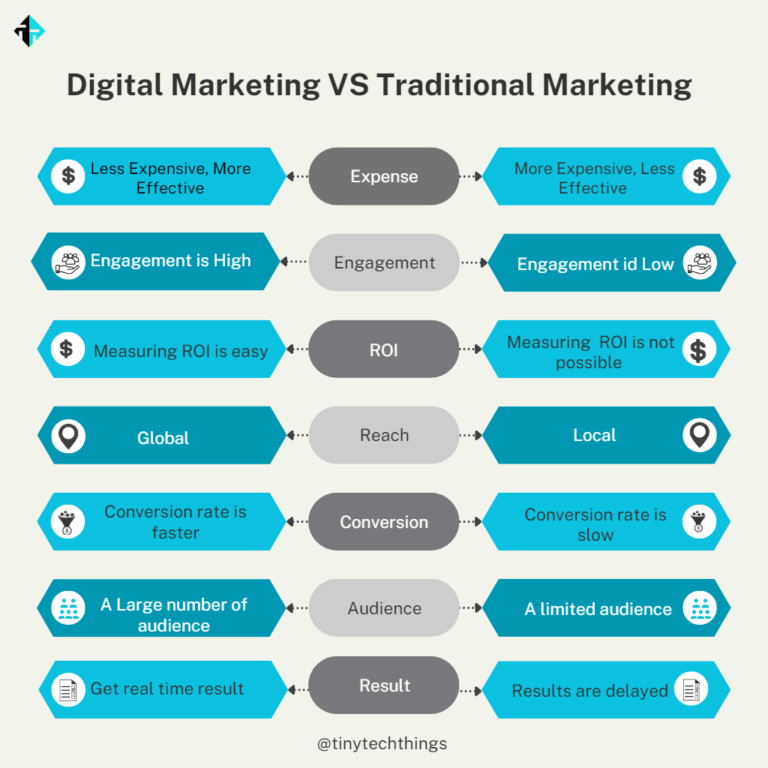
Global Reach:
In the exciting world of digital marketing, businesses have a remarkable opportunity to connect with people all over the globe, breaking free from geographical limitations. Through the power of online channels, businesses can effectively target and engage with potential customers from diverse regions.
This presents a vast array of opportunities, enabling businesses to extend their market reach well beyond their local confines.
Cost-Effectiveness:
Digital marketing frequently offers more affordable solutions when compared to traditional marketing strategies, which is one of its major benefits.
When businesses advertise through digital channels like social media platforms or search engine ads, they can customize their campaigns to fit different budgets. This accessibility is fantastic because it enables businesses of all sizes to execute their marketing strategies within their financial capabilities.
It’s really exciting to observe how digital marketing enables companies to maximize their resources and successfully target their potential consumers.
Targeted Marketing:
Digital marketing enables precise targeting based on demographics, interests, behaviors, and other relevant factors. Businesses can identify and focus on their ideal customer segments by leveraging data and analytics. This focused approach ensures that businesses target their marketing efforts toward people who are most likely to be interested in what they offer.
Thus, they have a better chance of turning these potential consumers into paying ones, increasing conversion rates.
Measurable Results:
Digital marketing offers powerful analytics and tracking capabilities, which provide valuable insights for marketers. By utilizing real-time data, they can readily evaluate the impact and success of their campaigns.
They can monitor website visitors, gauge user engagement with their content, track actual purchases of their products or services, and analyze other crucial indicators. This data-driven strategy empowers marketers to continuously optimize their campaigns and make more effective decisions regarding resource allocation. By leveraging these insights, businesses can maximize their marketing efforts and achieve better results.
Enhanced Brand Awareness:
Digital marketing allows businesses to greatly enhance their brand visibility and awareness. Influencer marketing, social media marketing, search engine optimization techniques, and content marketing are used to establish a strong online presence for this purpose. This increased brand visibility helps businesses stay at the forefront of their target audience’s minds and establish credibility in their industry.
Interactivity and Engagement:
Digital marketing channels enable businesses to have direct communication with their customers. Businesses can actively interact with their customers, gather feedback, and offer customer support by leveraging social media platforms, email marketing, live chat features, and online communities. This interactive approach helps build stronger relationships, increases customer satisfaction, and fosters customer loyalty.
How does digital marketing work?
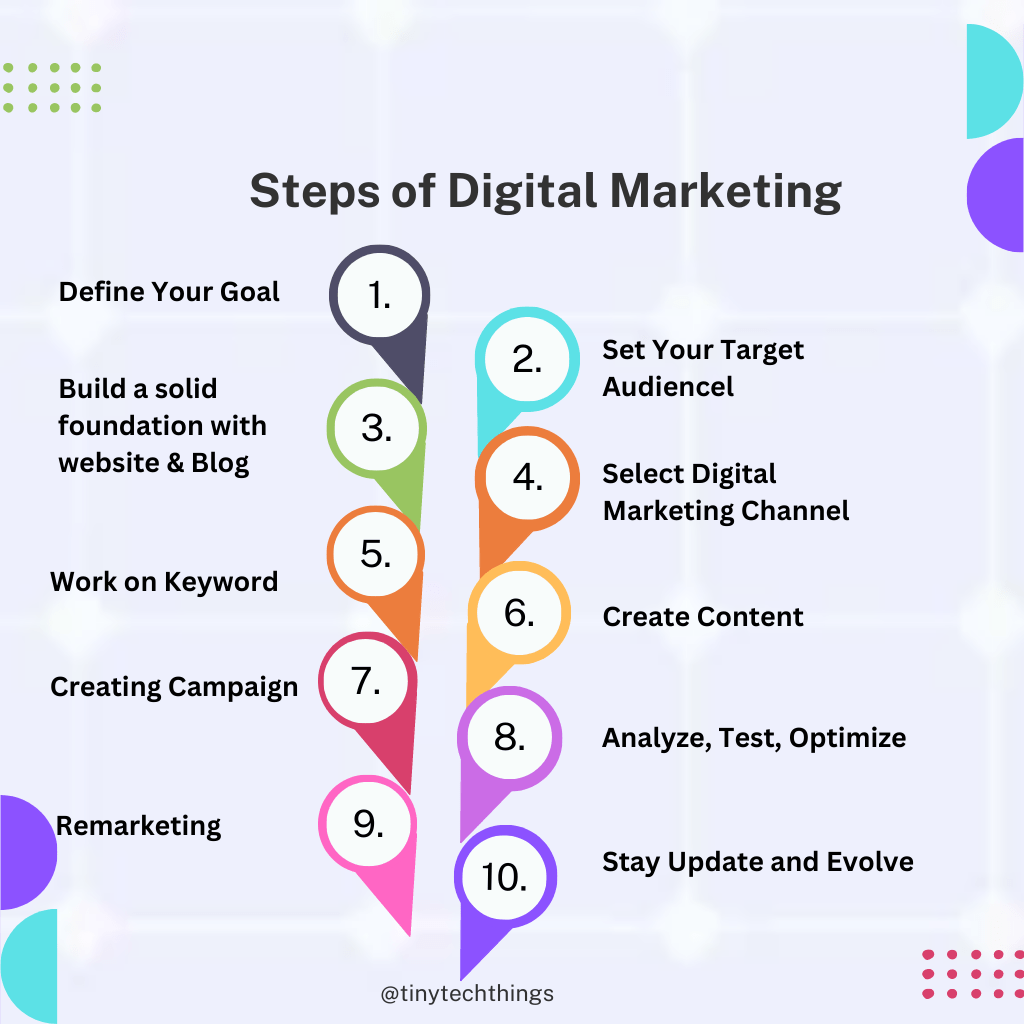
Define Your Goal:
Before diving into digital marketing, it’s important to define your goals. Your goals are what you want to achieve through your marketing efforts, such as increasing sales, brand awareness, or website traffic.
Set Your Target Audience:
Identify your target audience means understanding who your ideal customer are, their demographics, interest, and needs.
Build a solid foundation with a website and blog:
A well-designed, user-friendly website server as the foundation for your digital marketing efforts. Create an attractive and responsive website that aligns with your brand identity and offers a seamless user experience. Develop a content-rich blog to establish thought leadership, provide value to your audience, and enhance your website’s search engine visibility.
Select Digital Marketing Channel:
To establish a strong online presence, select the digital marketing channels that align with your audience and goals. Consider social media, email marketing, SEO, and PPC advertising to engage your audience, drive website traffic, and achieve success.
Work On Keywords:
Keywords play a crucial role in both SEO (Search Engine Optimization) and PPC (Pay-Per-Click) advertising. By conducting keyword research, optimizing your content, and targeting the right keywords, you can improve your website’s visibility in search results and drive targeted traffic to your site. Maximize the potential of SEO and PPC by focusing on relevant keywords that align with your audience’s search intent and your business goals.
Create Content:
Creating content involves developing and producing valuable and engaging material, such as articles, blog posts, videos, or social media posts, with the goal of informing, entertaining, or educating your target audience.
Creating Campaign:
To achieve campaign success, it’s essential to plan and execute effectively. This involves creating compelling ads, publishing engaging content, and managing your social media channels.
Analyze, test and optimize:
The success of your digital marketing efforts relies on continuous analysis and optimization. Utilize analytics tools to track website traffic, user behavior, conversion rates, and campaign performance. Identify areas of improvement, test different strategies, and make data-driven decisions to optimize your digital marketing campaigns.
Stay Updated and Evolve :
Digital marketing is an ever-evolving field, with new tools, trends, and algorithms emerging regularly. Stay updated with industry news, attend webinars, and participate in relevant forums and communities. Continuously learn and adapt your strategies to stay ahead in the competitive digital landscape.
Digital Marketing Channel(Type):
Digital marketing channels are the tools and platforms businesses use to connect with their target audience online. From social media sites like Facebook and Instagram to search engines like Google, these channels offer opportunities to promote your brand and reach potential customers.
In this beginner-friendly introduction, we’ll explore the basics of digital marketing channels and how they can help you achieve success in the online world.
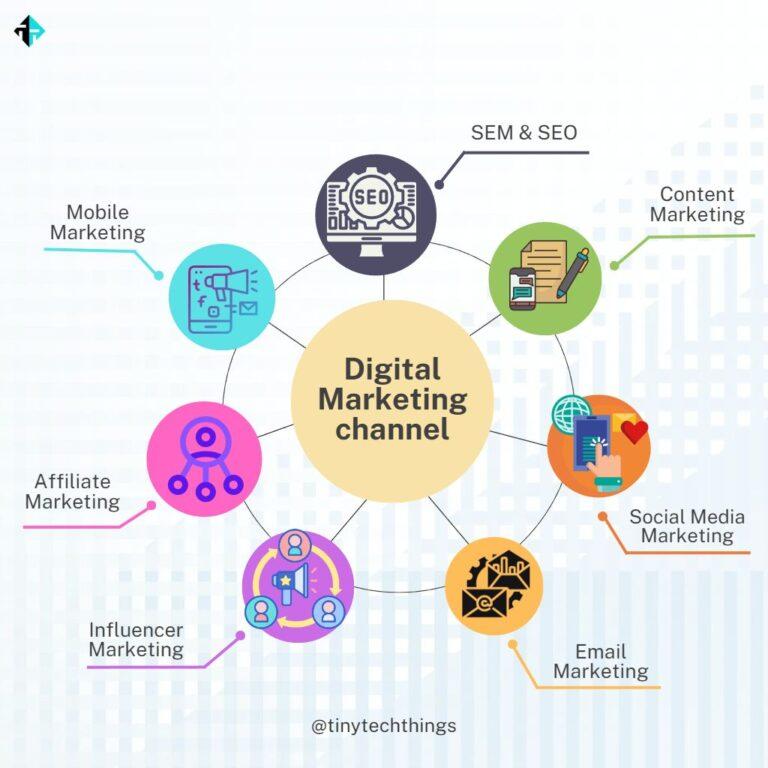
Search Engine Marketing (SEM)
SEM, or Search Engine Marketing, is a digital marketing strategy that helps websites get noticed in search engine results. It involves using paid advertising to boost visibility and drive targeted traffic.
The main aim of SEM is to attract more visitors to a website and convert them into customers. This is done by bidding on keywords related to your business and creating eye-catching ads that show up alongside regular search results.
SEM is an effective technique to raise your chances of success by putting your website in front of the appropriate audience at the right moment.
Search Engine Optimization (SEO)
SEO, or Search Engine Optimization, is about improving a website’s visibility in search results. It helps websites show up higher in organic search (non-paid) results when people search for relevant information.
By optimizing various aspects of a website, like content and structure, SEO makes it more attractive to search engines. This means more people can find the website, which can lead to increased traffic and potential customers.
SEO is a continuous endeavor that seeks to enhance the attractiveness of websites for both search engines and users.
Social Media Marketing:
Social media marketing is crucial for reaching and engaging target audiences today. It allows businesses to connect with people on platforms like Facebook, Instagram, and Twitter. By embracing social media, businesses may increase brand recognition, engage with customers, and create lasting connections.
The key benefits include direct communication, precise targeting, showcasing brand personality, and gaining valuable insights. Social media marketing helps businesses reach a wide audience, create engagement, and achieve their marketing objectives.
Content Marketing:
Content marketing aims to help businesses reach and engage their target audience by producing and sharing good content.
Instead of directly selling, it focuses on providing useful information or entertainment. Businesses may increase client engagement, and create reputation, and brand recognition with content marketing.
Generate traffic to their website and conversions, it entails producing blog articles, videos, and social media content.
Email Marketing:
Email marketing is an effective technique for establishing and preserving client relationships. It involves sending targeted and personalized emails to people who are interested in your business.
Through email, you can provide valuable content, promotions, and updates directly to your customers’ inboxes. This helps build loyalty, encourage repeat purchases, and increase customer retention.
With email marketing, you can segment your audience, automate campaigns, and track results to improve your overall marketing efforts. It’s a cost-effective way to engage with your customers and drive business growth.
Influencer Marketing:
Influencer marketing is forming alliances with powerful figures in your sector to sell your goods or services. By leveraging their reach and credibility, you can expand your brand’s exposure, tap into new audiences, and gain social proof.
Affiliate Marketing:
Affiliate marketing enables you to collaborate with affiliates who promote your products or services in exchange for a commission. By leveraging their networks and incentivizing them, you can increase your brand’s reach and drive sales.
Video Marketing:
Video marketing has gained immense popularity, thanks to platforms like YouTube and social media.
You may engage your audience, highlight your goods or services, and increase brand engagement by making interesting and educational videos.
Mobile Marketing:
With the increasing use of smartphones, mobile marketing has become vital. By optimizing your website and content for mobile devices, running mobile ads, and leveraging location-based targeting, you can reach users on the go and enhance their mobile experience.
Staying Updated with Digital Marketing Trends
Staying updated with digital marketing trends is important for businesses today.
Let’s understand why it matters and how it can benefit your marketing efforts.
Understanding Your Customers:
By keeping up with digital marketing trends, you can learn how your customers behave online, what content they prefer, and how they make buying decisions. This helps you tailor your marketing strategies to effectively reach and engage them.
Staying Ahead of Competitors:
When you stay updated with trends, you gain an advantage over your competitors. You can adopt new strategies, leverage emerging technologies, and seize opportunities before others do. This helps you stand out and attract more customers.
Relevance and Personalization:
Digital marketing trends often focus on personalized targeting. By staying updated, you can segment your audience, deliver personalized content, and create meaningful experiences. This boosts customer satisfaction, engagement, and conversions.
Embracing Technology:
Digital marketing is closely tied to technology. By staying updated with trends, you can learn about emerging technologies like AI, VR, chatbots, and voice search. Understanding them helps you adapt your strategies and enhance customer experiences.
Optimize Your Efforts:
Digital marketing trends introduce new tools, platforms, and techniques that can optimize your marketing efforts. By staying updated, you can discover and leverage these advancements to streamline processes, automate tasks, and improve your campaign performance.
Future-Proof Your Business:
Staying updated with digital marketing trends prepares you for the future. You can anticipate changes in consumer behavior, technological advancements, and industry developments. Being proactive ensures you can adapt quickly and make informed decisions.
Leveraging Online Courses and Resources
Leveraging online courses and resources is a powerful way to acquire knowledge, develop new skills, and stay updated in today’s rapidly evolving world.
Online learning platforms and resources have become invaluable for individuals seeking to gain expertise in digital marketing. These platforms offer a wide range of courses, tutorials, and resources dedicated to helping learners acquire the knowledge and skills necessary to excel in the field.
Let’s explore some popular online learning platforms and resources specifically tailored to digital marketing education.
Google Digital Garage:
Google Digital Garage is a free online platform that offers courses and certifications in various digital marketing topics. Learners can access courses on search engine marketing (SEM), search engine optimization (SEO), social media marketing, and more. Google Digital Garage provides practical knowledge and tips directly from Google’s experts.
HubSpot Academy:
HubSpot Academy is a leading resource for digital marketing education, offering free online courses and certifications. Their courses cover a wide range ofdigital marketing disciplines, including inbound marketing, email marketing, social media, and SEO. HubSpot’s resources are known for their practical approach and actionable insights.
LinkedIn Learning:
LinkedIn Learning, formerly known as Lynda.com, offers a vast library of courses on digital marketing and related topics. These courses cover a wide range of subjects, including social media marketing, content strategy, digital advertising, and data analytics. LinkedIn Learning’s courses are taught by industry experts and are designed to enhance professional skills.
Coursera:
Coursera is another reputable platform that partners with universities and educational institutions to offer digital marketing courses. These courses often provide comprehensive curriculum, covering topics like marketing analytics, digital strategy, consumer behavior, and e-commerce. Learners can earn certificates upon completion and may have the option to pursue more in-depth specializations.
Udemy:
Udemy is a widely recognized online learning platform that offers a vast selection of digital marketing courses. Learners can find courses on various topics, including SEO, social media marketing, content marketing, PPC advertising, and more. Udemy courses are created by industry experts and provide a mix of video lectures, quizzes, and practical exercises to enhance learning.
Data-Driven Decision-Making: Unlocking Digital Marketing Success
The importance of data-driven decision-making in digital marketing is found in its capacity to empower companies to make knowledgeable decisions based on real information rather than depending on assumptions or emotions. Here’s why it’s important in simple terms:
Understand Customers:
Data helps us learn about our customers—what they like, how they behave, and what influences their decisions. This helps us create marketing strategies that resonate with them.
Improve Campaigns:
By looking at data, we can see how our marketing campaigns are performing. We can learn which strategies work best and make changes to get better results.
Spot Opportunities:
Data helps us identify new trends and opportunities in the market. We can stay ahead of our competitors by understanding what customers want and adapting our strategies accordingly.
Personalize Experiences:
With data, we can personalize our marketing efforts to make customers feel special. By using their data, we can create tailored messages and offers that make them more likely to engage and buy from us.
Test and Learn:
Data allows us to experiment and see what works. We may conduct experiments, examine alternative techniques, and base our conclusions on data rather than preconceptions.
Measure Success:
Data helps us measure the return on investment (ROI) of our marketing activities. We can see if our efforts are paying off and make adjustments if needed.
Plan and Budget:
Data helps us make better predictions for the future. We can use it to forecast and plan our marketing activities, making sure we allocate resources wisely.
We can make better judgements, enhance our marketing initiatives, and improve our outcomes in the digital environment by leveraging data to inform our decisions.
Conclusion:
Learning digital marketing is an exciting and rewarding journey that requires dedication, continuous learning, and adaptability. By following this step-by-step guide, you’ll gain a solid foundation and the necessary skills to navigate the dynamic world of digital marketing. Remember, success in digital marketing comes with practice, experimentation, and a deep understanding of your target audience. Embrace the opportunities offered by the digital realm, and watch your brand flourish in the online space.
F.A.Q.
Unraveling the Digital Marketing Maze
- Yes, digital marketing is a good career choice for beginners. It offers a wide range of opportunities, a high demand for skilled professionals, and the potential for career growth and advancement in today’s digital-driven world.
To start learning digital marketing on your own:
- Explore online resources like tutorials, blogs, videos, and online courses.
- Focus on the areas of digital marketing that interest you the most.
- Practice hands-on by implementing strategies on personal projects or volunteer opportunities.
By following these steps, you can begin your journey of self-learning in digital marketing and gain practical experience along the way.
The basic steps of digital marketing typically include:
- Defining goals and target audience
- Conducting market research and competitor analysis
- Developing a comprehensive digital marketing strategy
- Implementing various digital marketing channels such as SEO, social media, content marketing, email marketing, etc.
- Monitoring and analyzing campaign performance using analytics tools
- Making data-driven optimizations and adjustments to improve results
Absolutely! Digital marketing is a flexible field that allows individuals, including housewives, to learn and practice the necessary skills. There are various online resources and courses available to support self-learning
The cost to start digital marketing varies based on factors like the scale of your efforts and the resources you choose. It’s possible to start with a small budget and gradually allocate more funds as you see results.
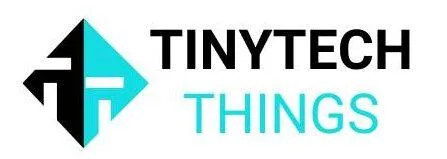



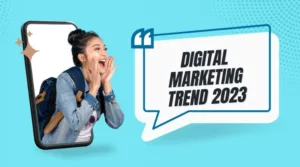
One thought on “How to Learn Digital Marketing Step by Step: A Comprehensive Guide for Beginners.”
Pingback: Key Digital Marketing Trends For 2023 - Tinytech Things